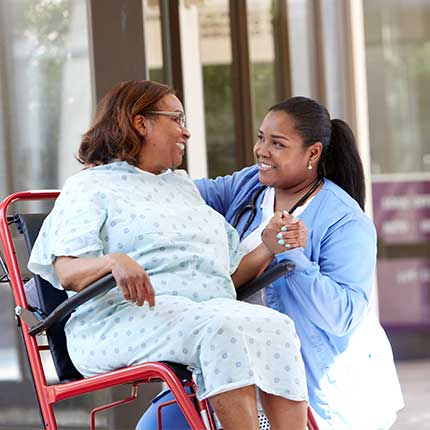Healthy Living
What to Expect After Weight Loss Surgery
After weight loss surgery, you’re on your way to closing the door on the negative effects of obesity and opening the door to a healthier life.
Your doctor will create a personalized plan for your post-surgery weight loss journey and answer your questions on next steps. To get a jump start, here are answers to a few frequently asked questions.
Weight loss surgery is generally designed for those with a body mass index (BMI) equal to or greater than 40, or equal to or greater than 35 with serious co-morbidities. Laparoscopic adjustable gastric banding with the Lap Band® is also FDA-approved for weight loss surgery in people with a BMI of 30 to 35 who have at least one obesity-related condition. Weight loss surgery is considered safe, but like many types of surgery, it does have risks. Consult with your physician about the risks and benefits of weight loss surgery.
Your doctor will create a personalized plan for your post-surgery weight loss journey and answer your questions on next steps. To get a jump start, here are answers to a few frequently asked questions.
Can I stop the medications I was taking before surgery?
Successful weight loss can reduce the risk of serious health conditions, including diabetes, high blood pressure, high cholesterol and heart disease. This may come with time so please consult with your doctor before stopping any medications you’re taking for these and other conditions.When can I return to work?
Most patients return to work within one or two weeks. It’s important to take it easy the first few weeks back on the job and avoid any heavy lifting to ensure a smooth recovery.What can I eat?
A personalized nutrition plan will be prepared for you. It will most likely start with a liquid diet after surgery and work its way to regularly textured food. Plenty of fluids and protein-rich foods will be key to improving your weight loss results.When can I start exercising?
Start exercising as soon as possible. Once you feel comfortable, you can ask a loved one or a member of your care team to join you for a walk around the hospital. After several weeks of recovery, it’s recommended to have approximately 150 minutes of moderate activity each week, including walking and jogging. If you enjoy swimming, please wait for the surgery site to heal before jumping in.Weight loss surgery is generally designed for those with a body mass index (BMI) equal to or greater than 40, or equal to or greater than 35 with serious co-morbidities. Laparoscopic adjustable gastric banding with the Lap Band® is also FDA-approved for weight loss surgery in people with a BMI of 30 to 35 who have at least one obesity-related condition. Weight loss surgery is considered safe, but like many types of surgery, it does have risks. Consult with your physician about the risks and benefits of weight loss surgery.
Source:
American Society for Metabolic & Bariatric SurgerySign Up for Health Tips
Get our advice and upcoming events about weight, pain, heart and more.



